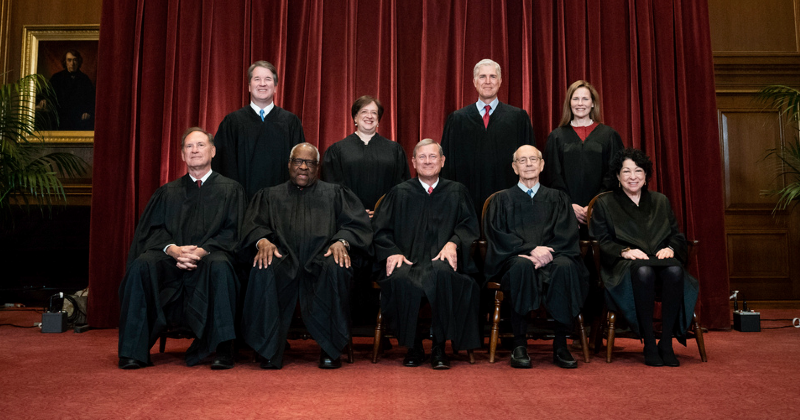The Supreme Court, flexing its conservative muscle, ruled on Tuesday that the state of Maine must include religious schools in a tuition program that paid only for private, “nonsectarian” education. In a 6-3 decision, rendered along ideological lines, the justices reignite a centuries-old debate about blurring the line between church and state.
Although the case attracted national attention, the issue was a small program in a state with fewer than 1.5 million people and which was designed solely to help parents in rural areas too thinly populated to support a local high school. The Maine statute allowed students to attend secondary school in neighboring districts – or attend a private school. This last provision, merely intended to help parents, became the point of contention. Seemingly trying to stay on the right side of the Constitution’s prohibition against state-sanctioned religion, the law excluded religious schools or those that taught students “through the lens of faith.”
To the six Supreme Court justices who carried the day in Carson v. Makin, this provision went too far. “There is nothing neutral about Maine’s program,” the majority opinion declared. “The State pays tuition for certain students at private schools — so long as the schools are not religious. That is discrimination against religion.”
In a spirited defense, written by Justice Sonia Sotomayor, the three liberal justices warned that their colleagues are leading the country “to a place where the separation of church and state becomes a constitutional violation.” Sotomayor added, “This court continues to dismantle the wall of separation between church and state that the Framers fought to build.”
Joining the dissent, Justice Stephen Breyer argued that the GOP-appointed justices overstressed the Free Exercise Clause, which forbids the government from prohibiting the free exercise of faith, at the expense of the Establishment Clause, which prohibits the establishment of religion.
University of California, Berkeley, law school dean Erwin Chemerinsky sided with the liberal justices, telling RCP that “the Court essentially ignores the Establishment Clause” and “is obliterating any notion of a wall of separation church and state” as “the conservative justices do not believe in that concept.”
Anticipating this criticism, the chief justice begged to differ. “A neutral benefit program in which public funds flow to religious organizations through the independent choices of private benefit recipients does not offend the Establishment Clause,” Roberts wrote. “A State’s antiestablishment interest does not justify enactments that exclude some members of the community from an otherwise generally available public benefit because of their religious exercise.”
To those who follow the issue of religious freedom, Carson was not a surprise. It is consistent with precedent – the Court cited Espinoza v. Montana Department of Revenue and Trinity Lutheran Church of Columbia v. Comer, two recent cases which decided that state funds could not be denied from religious organizations solely because they were sectarian in nature.
But the modern-day tension between the Free Exercise Clause and the Establishment Clause is rooted in the Founding era. Because the colonies had varying levels of preferred denominations and taxes to support those preferred denominations at the time the Constitution was penned, one might have read the Establishment Clause as barring Congress from making laws respecting establishment of religion in the states. Today, we understand the clause as prohibiting Congress from establishing a state-sanctioned church.
Tensions arise when the court affords equal protection to religious organizations, because liberals believe that by providing state protection – and in recent cases, state funds – the court is in fact “obliterating the wall of separation” and de facto establishing some semblance of state religion.
Yet the court has long held that indirect aid to religion does not necessarily violate the wall of separation. Justin Dyer, director of the Kinder Institute on Constitutional Democracy, explained to RCP that when the state makes a benefit generally available, but “carves out the one single exception of using it at a religious institution, that is discriminatory and violates Free Exercise principles.”
That was the principle at issue in Carson, and in Espinoza v. Montana, a 2020 case decided on a 5-4 vote that overturned a state law precluding private school scholarships – if those schools were sectarian. It is up to the state to allocate its funds, the court ruled, but if a state chooses to subsidize private education, “it cannot disqualify some private schools solely because they are religious,” Roberts wrote in that decision.
Although various legal scholars warn that the courts are legitimizing theocratic impulses of religious conservatives in this country, viewed in a historic context – and compared, say, to the Middle East – such fears seem overblown.
On a basic level, the separation of church and state simply means that the offices of church and government are distinct. In the United States, there is still no relationship between the offices of government and the offices of the hundreds of faiths, denominations, and church organizations. There has never been any religious test for holding public office.
“If I were looking to say that there was an obliteration of [the line between] church and state, I would be looking for whether or not there was an official church of the United States with some public official at its head, appointing the bishops who then had representation in Congress,” explained Dyer. “But to say that applying an equal protection principle, or a religious liberty principle…is obliterating or dismantling the separation of church and state, seems pretty strong to me.”
Additional freedom of religion cases are in the pipeline. It’s likely that in the pending Kennedy v. Bremerton School District and Roman Catholic Diocese v. Cuomo decisions the Free Exercise Clause will trump the Establishment Clause – no pun intended – but that does not mean the wall of separation is crumbling.
Adeline Von Drehle is a rising senior at the University of Missouri studying American history. She will spend the coming year as an Oxford fellow at Corpus Christi College. This piece originally ran at RealClearPolitics.









